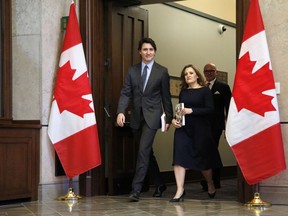Finance Minister Chrystia Freeland is set to table the federal government’s fall economic statement on Monday
Article content
OTTAWA — With the fall economic statement presented just before they go back to their ridings for Christmas, some Liberal MPs expressed concern that their government will be blowing past their self-imposed target of keeping deficits below $40 billion.
Article content
Article content
“It’s not an unlimited pot,” said Liberal MP Wayne Long about the federal government’s financial means. “I think that we do need to show fiscal restraint.”
Advertisement 2
Article content
“I’m a Liberal that believes in more centrist views and I think that if we state that we have a $40 billion guardrail, we stay within those numbers,” he added.
Finance Minister Chrystia Freeland is set to table the federal government’s fall economic statement on Monday, during which she will unveil the state of the country’s finances.
While Freeland has committed to meeting the forecasted debt-to-GDP ratio she set for the current fiscal year, she has so far refused to confirm that she will be able to keep the deficit at or below $40.1 billion — despite promising to do so in last April’s budget.
“What’s important is having sustainable public finances. We do and the numbers that I present on Monday will elaborate on that,” she said.
Liberal MP Brendan Hanley agreed that his government should be presenting a “fiscally responsible framework” so that it is “able to invest in Canadians.”
“Let’s see what Monday’s plan is… I’m looking forward to it,” he said.
On Wednesday, Conservative MPs predicted that the upcoming deficit number would be “very concerning” and probably “too large” as they were walking into their last caucus meeting of the year. One of them said “let’s get it down” as he walked by reporters.
Article content
Advertisement 3
Article content
Liberal MP Marcus Powlowski said his personal preference would be for his government to present “zero deficit,” but added that “it’s not going to happen.”
He compared the situation to setting a household budget for the year and running into unexpected expenses.
“Occasionally, things are going to come up. Your car breaks down, there’s a hole in the roof. You’ve got to spend extra money. I mean, that’s the reality of life,” he said.
Liberal MP Yvan Baker argued, as Freeland has done many times before, that Canadians should consider the “bigger picture.”
He said Canada has the lowest debt-to-GDP in the G7. “That means our deficit and debt are lower, relative to our economy, than France, than the U.K., than Germany. We’re only two countries that have triple A credit ratings,” he said.
“I think we’re in a very strong financial position.”
There is already an expectation in Ottawa that the government will present a larger deficit.
In October, Parliamentary Budget Officer Yves Giroux predicted that the government was “unlikely” to meet its budget target of $40.1 billion. Giroux said he estimated the 2023-2024 deficit to be $46.8 billion and to “marginally decline” to $46.4 billion in 2024-2025.
Advertisement 4
Article content
That was before the government announced its plan to temporarily waive the GST and HST on a slew of items for two months, and to give $250 cheques to most working Canadians.
The holiday tax break will be in effect as of Saturday and is expected to deprive government coffers of $1.6 billion in revenue during this fiscal year.
The cheques are expected to cost $4.68 billion but would be sent in April 2025, which would be added to next year’s deficit. However, the Liberals have still not tabled legislation to enact that measure as they face pressure to extend the cheques to more Canadians.
The NDP and the Bloc Québécois have been advocating for the cheques to extend to retirees, people with disabilities and other vulnerable groups who are unable to work and therefore would not benefit from the extra help the government has proposed.
Despite their concerns about the deficit ballooning and the expensive affordability measures, Liberal MPs did not express any desire to scrap the $250 cheques.
Long said the cheques are still a “great idea” and pondered if the proposal could be tweaked so they could be sent to more people at no extra cost. Long suggested for instance lowering the salary limit to under $150,000 or giving a lower amount than $250.
Advertisement 5
Article content
“When we come out with a $250 cheque for a certain segment, it divides,” he said.
Liberal MP Yasir Naqvi said his caucus has been pushing the government to present more affordability measures and that he is glad that it acted to help with the cost of living.
Government House leader Karina Gould would not speculate on whether the cheques would be part of the upcoming fall economic statement, and if there would be tweaks to ensure the measure would receive support from at least one opposition party.
For now, the government still has no dance partners to make that happen.
“We’re dancing by ourselves,” said Powlowski.
National Post
calevesque@postmedia.com
Our website is the place for the latest breaking news, exclusive scoops, longreads and provocative commentary. Please bookmark nationalpost.com and sign up for our newsletters here.
Article content







